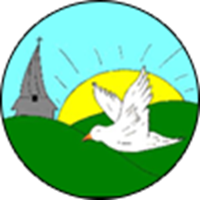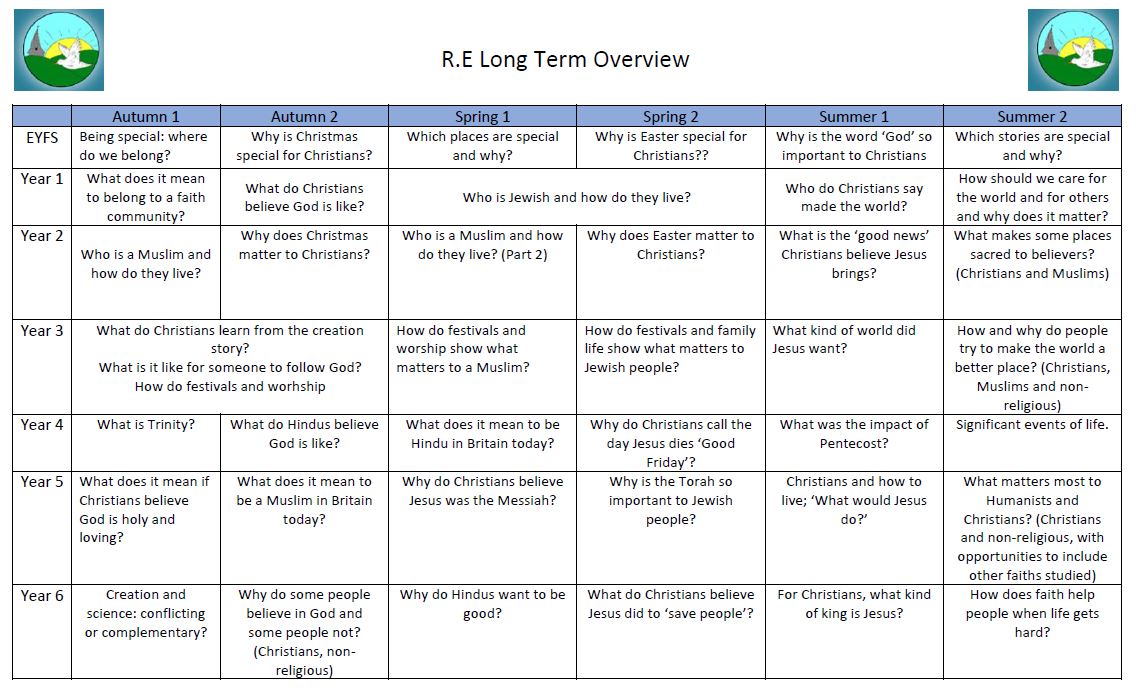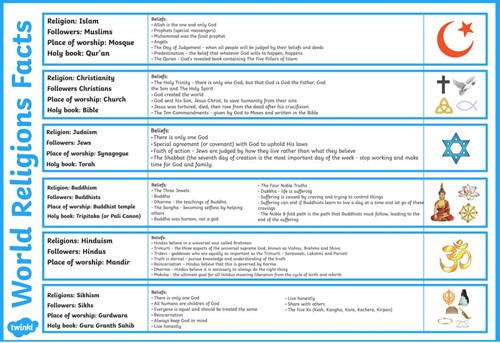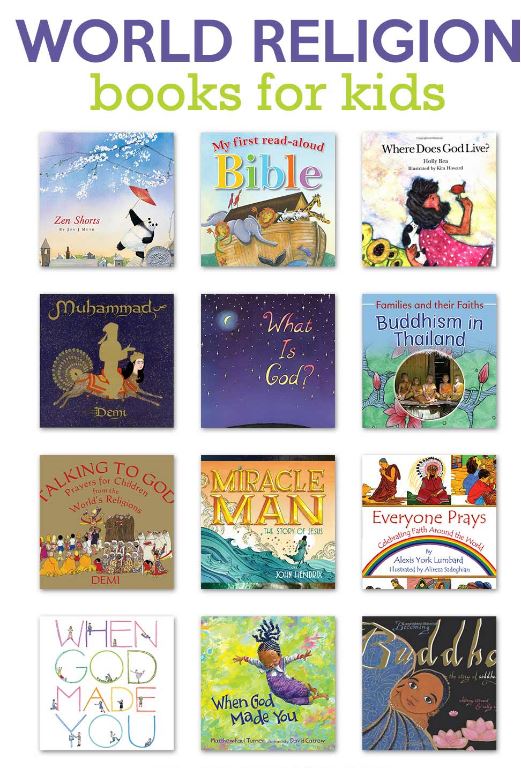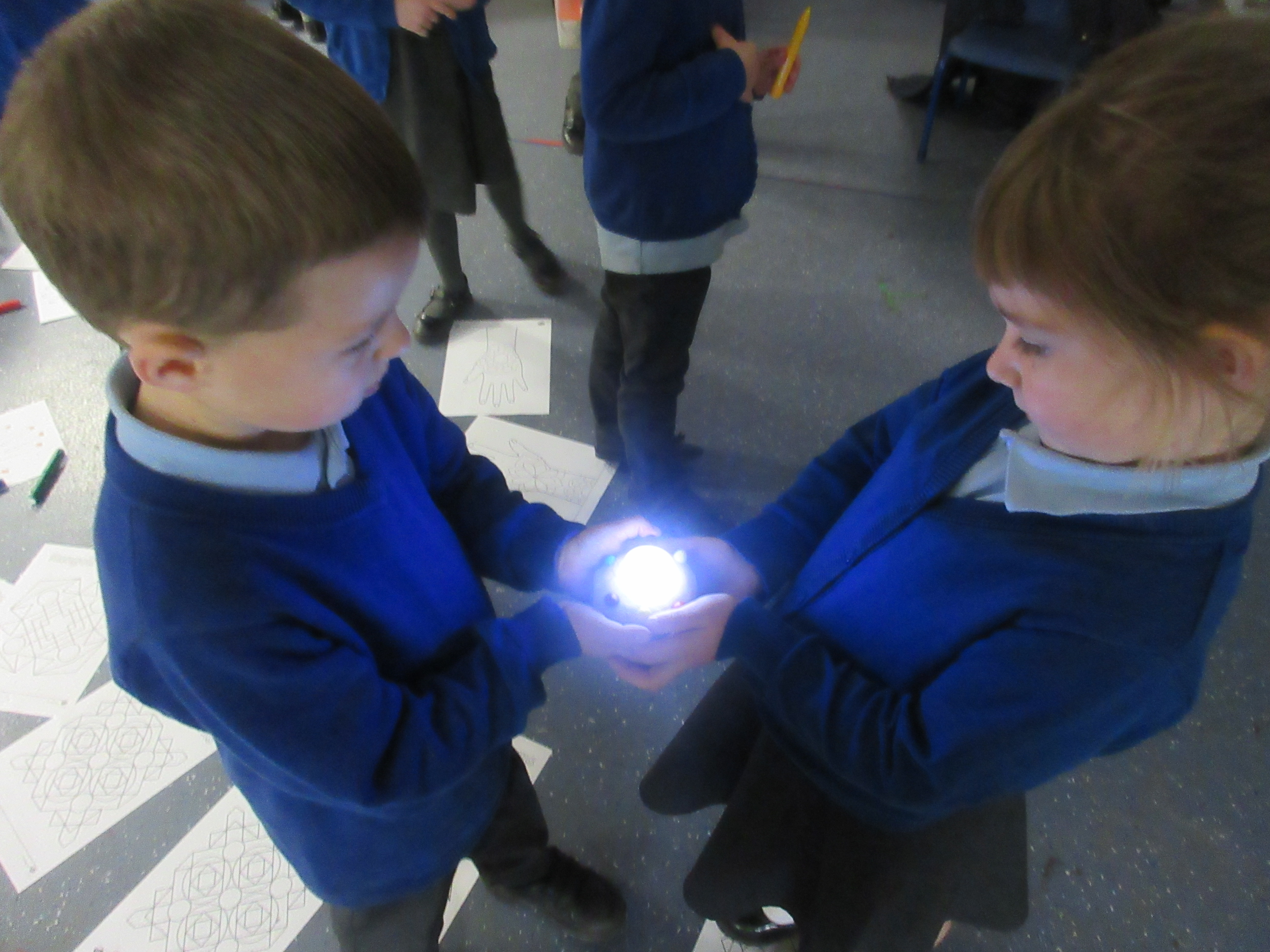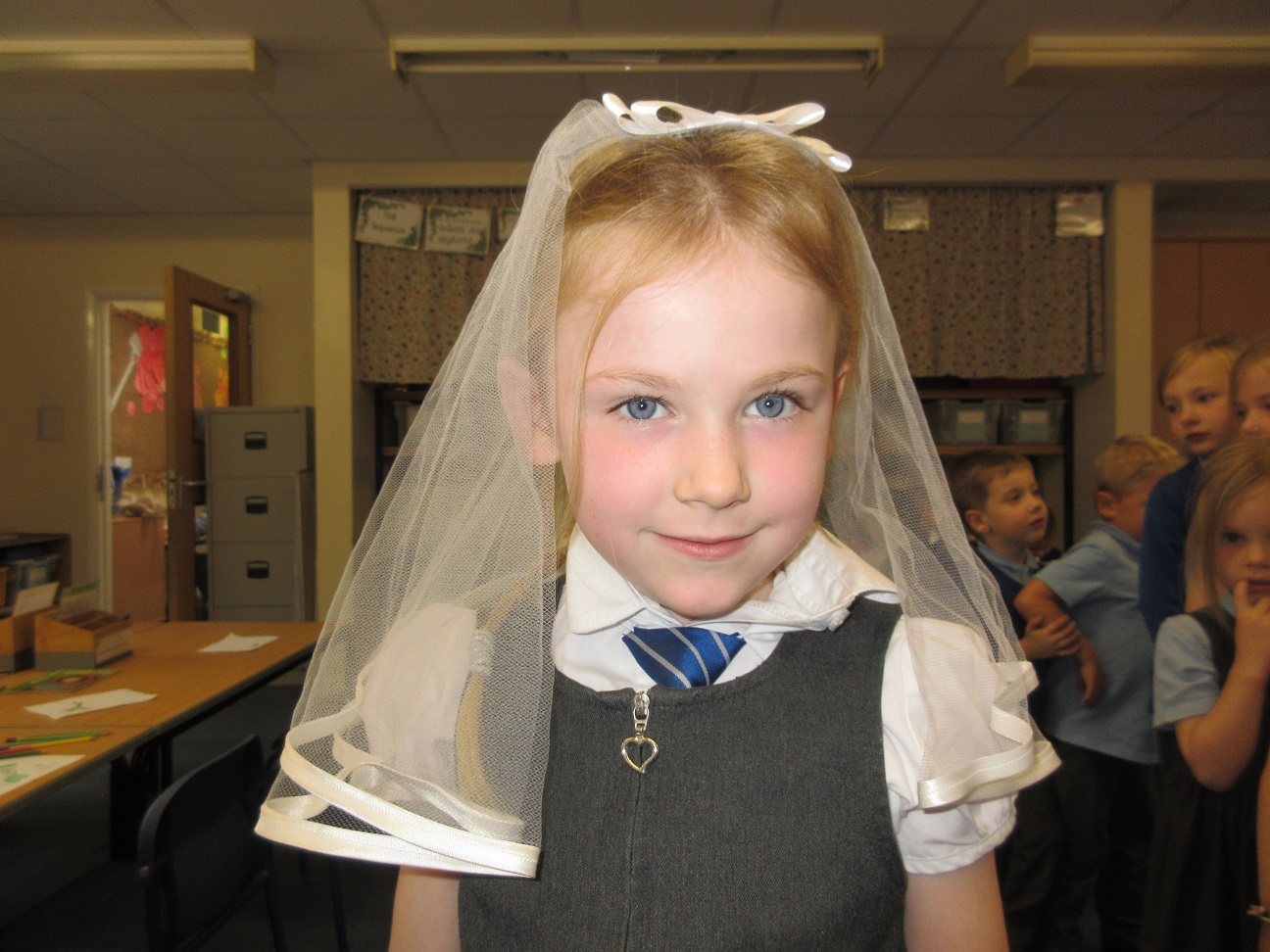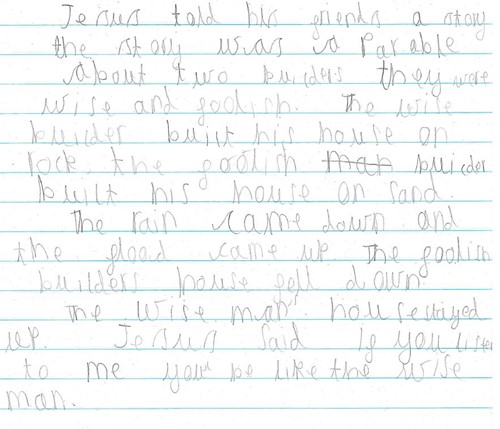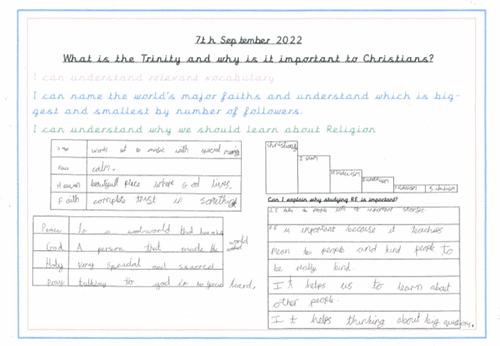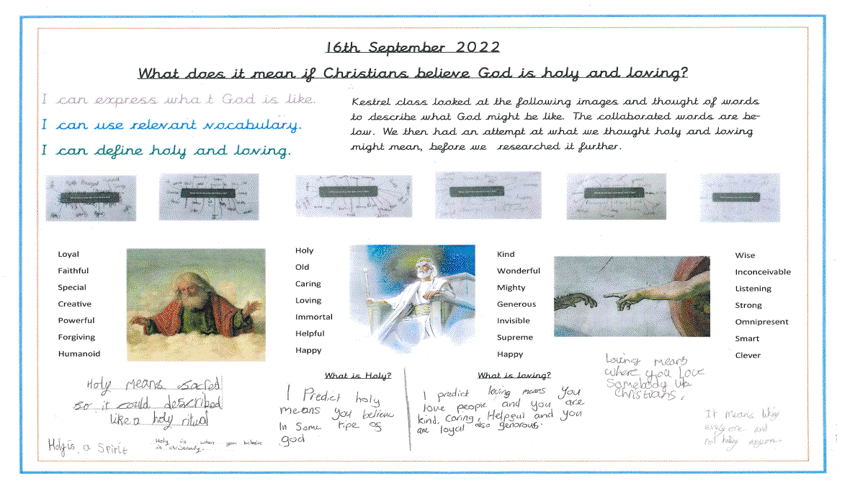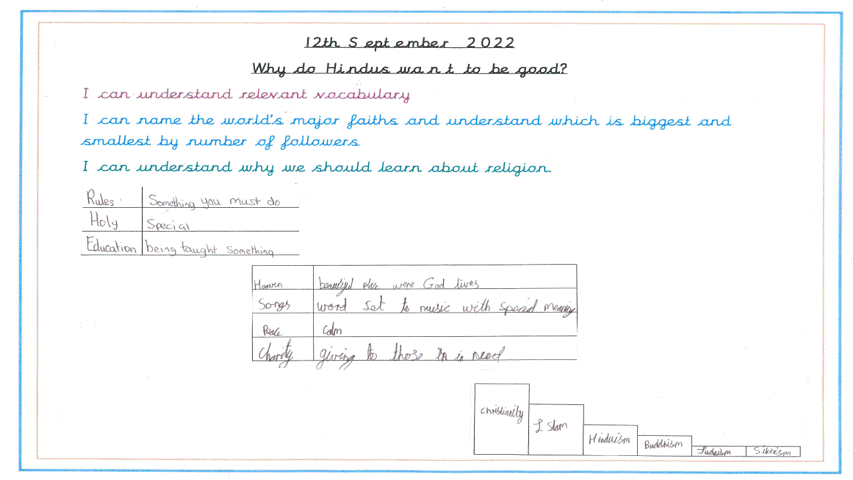Religious Education Curriculum Statement
Intent
Our curriculum sets out: the significant and key knowledge that pupils should know and remember as well as the skills that the children will develop and build on; the key concepts that children will return to in different contexts and year groups; the prior learning that the children can build on; the vocabulary that will be introduced as well as the sequencing and progression of the units to be taught.
At Cleobury Mortimer Primary School, we challenge everyone to be the best that they can be. High expectations, standards and values are promoted throughout the school and within all lessons. At Cleobury Mortimer Primary, we aim to create learners that are equipped for the future with knowledge and skills such as; independence, resilience, motivation and respect. Religious Education is taught to encourage learners to embody these important qualities; to be independent, motivated and respectful of all others. Religious Education is implemented following the Shropshire Agreed 2021-2026 Syllabus. The Principle Aim of R.E. is to engage children in systematic enquiry into significant human questions which religion and world views address. Children develop the understanding and skills needed to appraise varied responses to these questions as well as developing responses of their own.
The 2021 Shropshire Agreed Syllabus provides a syllabus for Religious Education (RE) for Shropshire schools. Since 1944, all schools have been required to teach RE to all pupils on roll (except those withdrawn by their parents). RE remains part of the basic curriculum for all pupils.
This syllabus explains the value and purposes of RE for all pupils, and specifies for teachers what shall be taught in each age group. It provides a coherent framework for setting high standards of learning in RE and enabling pupils to reach their potential in the subject. It offers detailed support for teachers, with an emphasis on the following:
RE and personal development: The 2021 syllabus emphasises RE’s contribution to the personal development of pupils. RE is not simply about gaining knowledge and understanding about religious and non-religious worldviews. It also helps pupils to develop their own worldviews – their own understanding of the world and how to live, in the light of their learning, developing their understanding, skills and attitudes. Most pupils in Shropshire schools will not have a religious worldview, and RE offers opportunities to explore some of the big questions addressed by religious traditions and non-religious philosophical convictions. Through their encounter with the responses of these traditions to big questions, pupils will learn that having a good and meaningful life and being a good person are achievable by anyone regardless of whether they are religious or not. RE also makes a significant contribution to pupils’ spiritual, moral, social and cultural development, as well as giving opportunities for exploring British values.
Religions and worldviews: The 2021 syllabus sets out the required study of religions and beliefs (religious and non-religious worldviews) in each key stage, with scope for including worldviews represented locally, both religious and non-religious.
Open, enquiring RE: The 2021 syllabus enables open, enquiring, exploratory RE, suitable for pupils who have a religious worldview of their own as well as for those who have non-religious worldviews. It also enables exploration of a diversity of views that lie within each religious and non-religious worldview.
Coherent understanding: There is a focus on helping pupils to develop a coherent understanding of several religions, by studying one religious or non-religious worldview at a time (systematic study) before bringing together and comparing (thematic study). The thematic study allows pupils to draw together their learning each year.
Core concepts: Clarity about identifiable core concepts of religions and beliefs helps teachers and pupils to understand how beliefs and practices connect, so that pupils are able to build effectively on prior learning as they progress through the school. This spiral curriculum supports teachers in creating a coherent curriculum journey for pupils.
Teaching and learning approach: There is a clear teaching and learning approach at the heart of the 2021 syllabus, whereby all units enable pupils to ‘make sense’ of the religions and beliefs studied, ‘understand the impact’ of these beliefs in people’s lives, and to ‘make connections’ in their learning and their wider experience of the world. This ‘making connections’ element ensures that RE is taught with reference to the pupils and their worldviews in an age-appropriate, critical way.
Implementation
Children are taught RE in an open and safe environment. Children are encouraged and free to ask questions and seek answers for themselves, with guidance from teachers. They have the opportunity to explore a range of religions, faiths and beliefs. They are able to describe, explain and analyse beliefs and practices. Children are taught to recognise diversity within our local community and the wider world. This learning takes place during weekly RE lessons across all year groups and we also have specific RE days which are held throughout the year. All children develop the skills needed to engage seriously with religions and world views. This allows learners to have the opportunity to enquire and investigate about key concepts in faiths and beliefs. Learners gain the ability to make enquiries into what enables different individuals and communities to live together respectfully and articulate beliefs and values. Learning is not always recorded in a formal written way. Children are given the opportunity to use discussion, drama and art to interpret and present their understanding in different ways.
Impact
The impact of children’s progress and their ability to know more and remember more will be visible through a range of methods. These may include end of unit assessments or quizzes, hot and cold tasks, spoken responses, progress over time in pupils’ books, extended writing or even an end of unit project.
Children are respectful of all religions, faiths and beliefs. They are taught to be respectful of others’ beliefs when learning about and discussing different faiths and beliefs. Learners are able to draw similarities and differences confidently. Children have the confidence to respectfully ask questions, know where to seek answers and investigate further.
